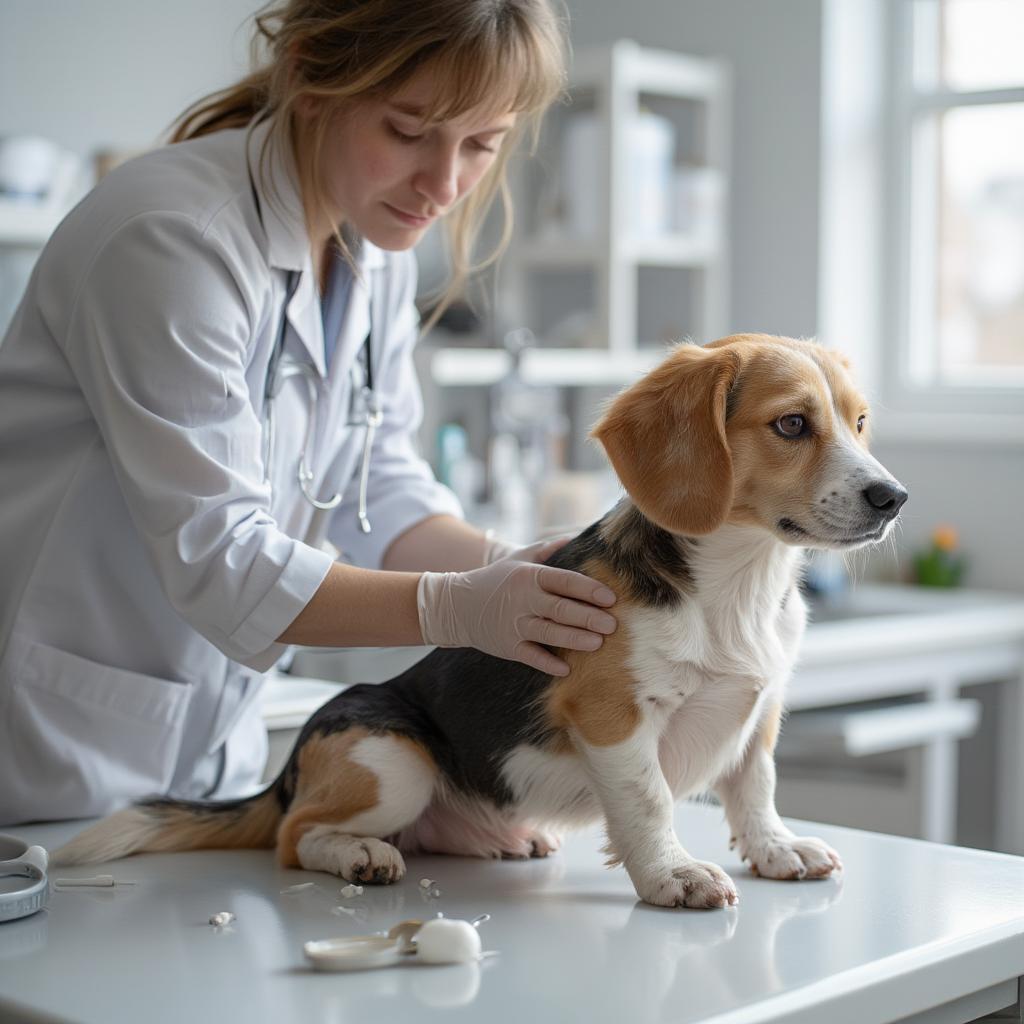Dogs, like humans, can suffer from severe allergies that significantly impact their quality of life. These allergies can manifest in various ways, including itchy skin, digestive upset, and even respiratory problems. One of the most effective ways to manage these allergies is through a carefully chosen diet. This comprehensive guide will delve into the Best Food For Dogs With Severe Allergies, helping you navigate the options and make informed decisions for your furry friend.
Finding the best food for dogs with severe allergies often involves identifying and eliminating the offending allergens from their diet. Common culprits include beef, chicken, dairy, wheat, corn, soy, and even certain types of fish. While identifying these allergens can be challenging, a process of elimination diet, guided by your veterinarian, can be invaluable. This involves feeding your dog a diet with a single novel protein source (a protein they haven’t eaten before) and a single carbohydrate source for several weeks to see if their symptoms improve.
Understanding Food Allergies in Dogs
Before we dive into specific food recommendations, it’s crucial to understand the nature of food allergies in dogs. Unlike environmental allergies, which often cause immediate reactions like sneezing and watery eyes, food allergies trigger a delayed hypersensitivity response. This means that symptoms can take several hours or even days to appear after consuming the allergen. This delayed reaction makes identifying the specific trigger even more challenging. Common symptoms include:
- Itchy Skin (Pruritus): This is often the most noticeable symptom and can lead to excessive scratching, licking, and chewing, potentially causing secondary skin infections.
- Gastrointestinal Issues: Vomiting, diarrhea, gas, and abdominal discomfort can also indicate a food allergy.
- Ear Infections: Chronic ear infections, often accompanied by head shaking and ear scratching, can be a sign of food allergies.
- Respiratory Problems: While less common, food allergies can sometimes trigger coughing, wheezing, and difficulty breathing.
 Veterinarian examining a dog's skin for allergies
Veterinarian examining a dog's skin for allergies
After the opening paragraph, let’s link to a relevant article about best dog food for sensitive stomach and skin: For dogs with less severe reactions, you can find more general information in our article about the best dog food for sensitive stomach and skin.
Key Ingredients to Look for in Hypoallergenic Dog Food
When choosing the best food for dogs with severe allergies, look for these key features:
- Hydrolyzed Protein: In this process, the protein is broken down into smaller pieces, making it less likely to trigger an allergic reaction. This is often the gold standard for dogs with severe food allergies.
- Novel Protein Source: This refers to a protein source that your dog has not been exposed to before, such as venison, kangaroo, duck, or rabbit.
- Limited Ingredient Diet: These diets contain a minimal number of ingredients, making it easier to pinpoint potential allergens. Look for foods with clearly labeled ingredients and avoid artificial colors, flavors, and preservatives.
- Single Carbohydrate Source: Similar to novel proteins, using a single carbohydrate source like sweet potato or brown rice can help reduce the risk of allergic reactions.
What is the Best Dog Food for Severe Allergies?
While no single “best” food exists for all dogs with severe allergies, here’s a breakdown of common approaches:
Hydrolyzed Protein Diets
Hydrolyzed protein diets are specifically formulated to minimize the risk of allergic reactions. The proteins in these diets are broken down into smaller fragments, making them less recognizable to the immune system. These are often prescribed by veterinarians and can be highly effective in managing severe allergies.
Novel Protein Diets
These diets utilize protein sources that are uncommon in commercial dog food. This minimizes the likelihood that your dog has previously been exposed to the protein and developed an allergy. Common novel proteins include venison, kangaroo, duck, and rabbit.
Limited Ingredient Diets
As discussed earlier, limited ingredient diets contain a minimal number of ingredients, making it easier to identify potential allergens. They often use novel protein and carbohydrate sources and avoid common allergens like beef, chicken, wheat, and corn.
Just as important as choosing the right food is understanding how to manage other potential allergens, such as fleas. You can learn more about over the counter flea medicine for dogs in our dedicated article.
Working with Your Veterinarian
It’s crucial to work closely with your veterinarian to determine the best course of action for your dog’s specific needs. They can perform allergy testing, recommend appropriate dietary changes, and prescribe medications to manage symptoms. Your veterinarian can also guide you through an elimination diet to pinpoint specific allergens. Just like understanding different skin diseases in dogs is vital for targeted treatment, knowing the specific allergen causing your dog’s discomfort is key to finding the right food. This may involve a combination of dietary changes, medication, and environmental management. Similar insights can be found in our article on common skin problems on dogs.
Conclusion
Choosing the best food for dogs with severe allergies is a crucial step in managing their condition and improving their quality of life. By understanding the underlying causes of food allergies and working closely with your veterinarian, you can develop a comprehensive plan to help your furry companion thrive. Remember, patience and persistence are key in this process. Finding the right food may take time, but the rewards of a healthy and happy dog are well worth the effort. Always consult with your veterinarian before making any significant changes to your dog’s diet, especially if they have severe allergies. The right food, along with proper veterinary care, can make a world of difference for your allergic dog.
Do you suspect your dog might have a food allergy? Our article on the best dog food for gi issues might offer further insights into digestive problems related to food sensitivities. This could be the first step towards a happier, healthier life for your beloved companion.
